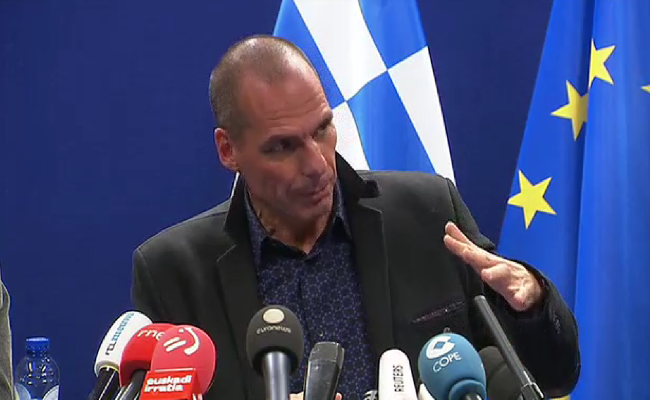By Tim Worstall, Forbes
My word, this is an interesting way of panicking the European powers that be on a Sunday afternoon. Yanis Varoufakis, the Greek finance minister, has suggested in an interview that any deal over Greece’s debt might or should be accompanied by a referendum on whether to accept it.
Or even a new election to see that the electorate still supports the Syriza party and movement over the issue. That’s really rather something that the European Union isn’t all that keen on, the actual electorate, the citizenry, having a say in how the continent is run. We can tell this as every time the electorate is in fact asked to vote if they vote the “wrong” way then they’re told to go away and vote and vote again until they come back with the correct answer.
Here’s what Varoufakis actually said:
If eurozone ministers do not accept seven major reforms Greece has put forward to unlock the next tranche of its much-needed bailout, “there could be problems,” he warned in an interview with Italian newspaper Corriere della Sera on Sunday.
“We can go back to elections. Call a referendum,” he told the best-selling daily, adding “we are not glued to our seats yet.”
That’s not so much putting a cat among the pigeons as throwing an enraged cat right into a cage of pigeons. For it’s entirely obvious that the Greek electorate just isn’t willing to settle for the sort of deal that the Eurogroup would find acceptable. It might be that the Eurogroup deal would be a sensible one but that still won’t make it acceptable to that electorate. And thus if Syriza goes back to ask for a further mandate this will strengthen their negotiating hand.
It’s at about this time that the European left starts shouting about “democracy!”. If the Greek electorate has voted for Syriza then Syriza should be allowed to get on with reducing austerity as the people have voted for. And they’re entirely right, democracy does indeed mean that he voters should get what they voted for, good and hard. However, there’s a slight difficulty here which tends to get left out of those cries of democracy. Which is that the Greek voters want to do that loosening austerity thing with the money of the taxpayers of other countries. Who, we might note, did not actually get a vote on this issue. And, moreover, who are highly likely to punish their own governments if they let Greece renege on some of that debt.
If Greek voters were to say, OK, no deal with the Eurogroup so we’ll have Grexit and struggle through ourselves then that would indeed be a decision solely for Greek voters. And it’s reasonably well known that Varoufakis himself has long favoured Grexit, even if he won’t say so in his current job. However, when the Greek voters are asking to do it all with German taxpayers’ money, well that’s when it all gets difficult in hte Eurogroup.
There’s also this:
(Story corrects to remove reference to the referendum being about the euro.)
Well, yes, except any such referendum would be about the euro. The deal on offer is always going to be a) here’s the Eurogroup deal, accept it or default and Grexit and b) here’s the Eurogroup deal accept it or default and Grexit. So any referendum that says reject the deal is always going to be one in favour of leaving the euro.
That idea of a referendum or election before acceptance of whatever the deal is doesn’t in fact change very much what the outlines of the deal are going to be. It strengthens the Greek negotiating position perhaps a little but that really is all.









